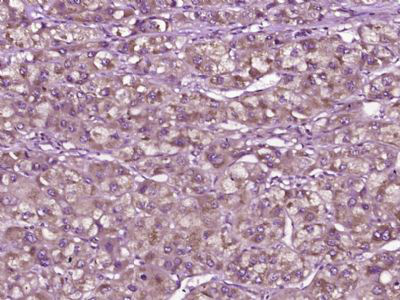产品货号 : mlR23694
英文名称 : MERTK
中文名称 : c-mer原癌基因酪氨酸激酶抗体
别 名: AI323366; MER + SKY; Brt; Bruton agammaglobulinemia tyrosine kinase; BYK; c-mer; c-mer proto-oncogene tyrosine kinase; Dtk; Etk 2; Eyk; FLJ16467; Mer; MER receptor tyrosine kinase; MERTK; MGC133349; Nyk; OTTMUSP00000017810; rdy; Receptor tyrosine kinase; Receptor tyrosine kinase MerTK; Receptor tyrosine tinase gene probably the gene for Rdy; Retinal dystrophy; RP23-30M20.1; RP23-356L21.1; RP38; RSE; Sky; STK kinase; Tif; TYRO3; TYRO3 protein tyrosine kinase 3; TYRO3 protein tyrosine kinase; Tyrosine protein kinase byk; Tyrosine protein kinase DTK; Tyrosine protein kinase RSE; Tyrosine protein kinase SKY.
研究领 : 域肿瘤
抗体来源 : Rabbit
克隆类型 : Polyclonal
交叉反应 : Human, Mouse, Rat, Dog, Pig, Horse, Rabbit,
产品应用 : IHC-P=1:400-800 IHC-F=1:400-800 ICC=1:100-500 IF=1:100-500 (石蜡切片需做抗原修复)
not yet tested in other applications.
optimal dilutions/concentrations should be determined by the end user.
分 子 量 : 108kDa
细胞定位 : 细胞膜
性 状 : Lyophilized or Liquid
浓 度 : 1mg/ml
免 疫 原 : KLH conjugated synthetic peptide derived from human MERTK :211-310/994 <Extracellular>
亚 型 : IgG
纯化方法 : affinity purified by Protein A
储 存 液 : 0.01M TBS(pH7.4) with 1% BSA, 0.03% Proclin300 and 50% Glycerol.
保存条件 : Store at -20 °C for one year. Avoid repeated freeze/thaw cycles. The lyophilized antibody is stable at room temperature for at least one month and for greater than a year when kept at -20°C. When reconstituted in sterile pH 7.4 0.01M PBS or diluent of antibody the antibody is stable for at least two weeks at 2-4 °C.
PubMed : PubMed
产品介绍 : The Major Facilitator Superfamily (MFS) is a large and diverse group of secondary transporters that includes uniporters, symporters, and antiporters. MFS proteins facilitate the transport across cytoplasmic or internal membranes of a variety of substrates including ions, sugar phosphates, drugs, neurotransmitters, nucleosides, amino acids, and peptides. They do so using the electrochemical potential of the transported substrates. Uniporters transport a single substrate, while symporters and antiporters transport two substrates in the same or in opposite directions, respectively, across membranes. Peptide-transporters 2 [solute carrier family 15 (H+/peptide transporter), member 2; SLC15A2; PEPT2 ; Oligopeptide transporter, kidney isoform ; Kidney H(+)/peptide cotransporter; ].
Function:
Receptor tyrosine kinase that transduces signals from the extracellular matrix into the cytoplasm by binding to several ligands including LGALS3, TUB, TULP1 or GAS6. Regulates many physiological processes including cell survival, migration, differentiation, and phagocytosis of apoptotic cells (efferocytosis). Ligand binding at the cell surface induces autophosphorylation of MERTK on its intracellular domain that provides docking sites for downstream signaling molecules. Following activation by ligand, interacts with GRB2 or PLCG2 and induces phosphorylation of MAPK1, MAPK2, FAK/PTK2 or RAC1. MERTK signaling plays a role in various processes such as macrophage clearance of apoptotic cells, platelet aggregation, cytoskeleton reorganization and engulfment. Functions in the retinal pigment epithelium (RPE) as a regulator of rod outer segments fragments phagocytosis. Plays also an important role in inhibition of Toll-like receptors (TLRs)-mediated innate immune response by activating STAT1, which selectively induces production of suppressors of cytokine signaling SOCS1 and SOCS3.
Subunit:
Interacts (upon activation) with TNK2; stimulates TNK2 autophosphorylation. Interacts (via N-terminus) with extracellular ligands LGALS3, TUB, TULP1 and GAS6. Interacts with VAV1 in a phosphotyrosine-independent manner.
Subcellular Location:
Membrane; Single-pass type I membrane protein.
Tissue Specificity:
Expressed predominantly in the hematopoietic lineages: macrophages, NK cells, NKT cells, dendritic cells and platelets. Post-translational modifications : Autophosphorylated on Tyr-744, Tyr-748 and Tyr-749 in the activation loop allowing full activity. Autophosphorylated on Tyr-867 leading to recruitment of downstream partners of the signaling cascade such as PLCG2.
Post-translational modifications:
Autophosphorylated on Tyr-744, Tyr-748 and Tyr-749 in the activation loop allowing full activity. Autophosphorylated on Tyr-867 leading to recruitment of downstream partners of the signaling cascade such as PLCG2.
Similarity:
Belongs to the protein kinase superfamily. Tyr protein kinase family. AXL/UFO subfamily.
Contains 2 fibronectin type-III domains.
Contains 2 Ig-like C2-type (immunoglobulin-like) domains.
Contains 1 protein kinase domain.
SWISS:
Q12866
Gene ID:
10461
Important Note:
This product as supplied is intended for research use only, not for use in human, therapeutic or diagnostic applications.
主要用于肿瘤方面的研究
产品图片












